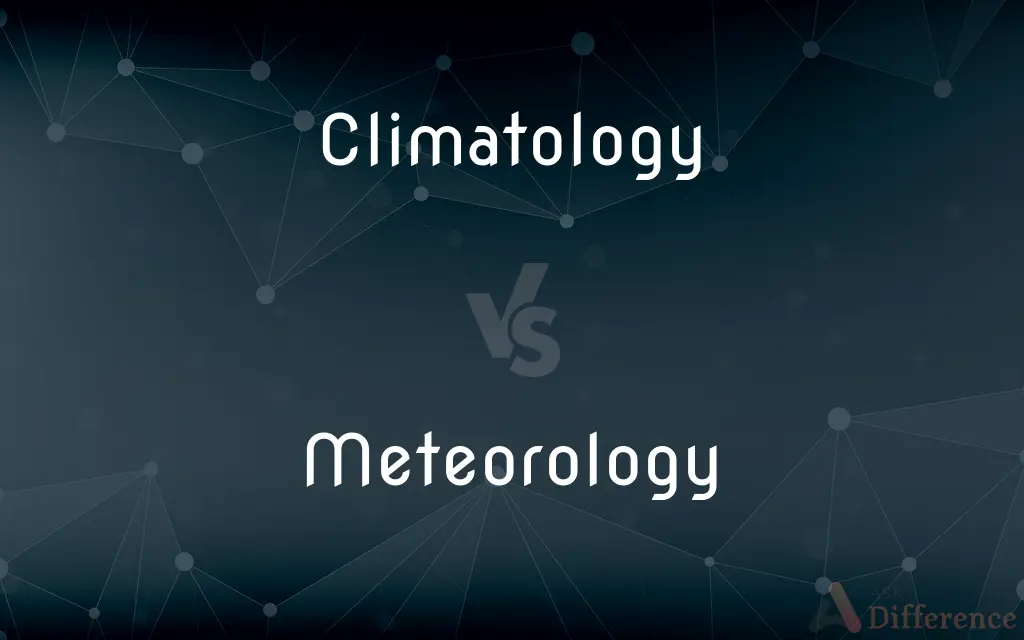Climatology vs. Meteorology — What's the Difference?
Edited by Tayyaba Rehman — By Maham Liaqat — Updated on April 18, 2024
Climatology studies climate patterns over long periods, focusing on averages and trends; meteorology deals with short-term weather conditions and forecasting.

Difference Between Climatology and Meteorology
Table of Contents
ADVERTISEMENT
Key Differences
Climatology examines the statistical weather patterns collected over many decades to understand long-term trends and variations in climate, whereas meteorology focuses on the atmospheric conditions that determine day-to-day weather.
Climatologists study how climate changes over time and across different global regions, while meteorologists analyze atmospheric phenomena like clouds, precipitation, and storms to predict weather events.
Climatology uses historical weather data to model future climate scenarios, aiding in the study of global warming and climate change, whereas meteorology utilizes real-time data to provide immediate weather forecasts and warnings.
Research in climatology often informs policy decisions related to environmental management and urban planning, highlighting long-term strategies for adaptation to climate change, while meteorology is crucial for emergency response, aviation, and agriculture by providing timely weather information.
The tools and methods in climatology include satellite imagery, paleoclimatology, and climate models to study broad patterns, on the other hand, meteorology relies heavily on radar, satellites, and computer models to forecast weather conditions over short periods.
ADVERTISEMENT
Comparison Chart
Focus
Long-term climate patterns
Short-term weather conditions
Data Usage
Historical and broad datasets
Real-time atmospheric data
Primary Concern
Climate trends, global warming
Weather forecasting, storm tracking
Tools and Technologies
Climate models, paleoclimatology
Weather radar, forecasting models
Application
Policy making, environmental planning
Emergency management, aviation, agriculture
Compare with Definitions
Climatology
Aids in the study of global environmental changes.
Climatology helps assess the impact of human activities on global temperatures.
Meteorology
Studies atmospheric phenomena including storms and precipitation.
Meteorology helps in understanding the formation of hurricanes.
Climatology
The science that studies climate, analyzing long-term atmospheric patterns.
Climatology has revealed significant warming trends over the past century.
Meteorology
Deals with the study of atmospheric conditions to predict weather events.
Meteorology uses sophisticated models to forecast tomorrow’s weather.
Climatology
Essential for policy formulation on climate adaptation.
Governments rely on climatology for developing effective environmental policies.
Meteorology
Important for operational decision-making in various sectors.
Meteorology supports pilots by providing crucial weather updates.
Climatology
Focuses on the averages and variations in weather over long periods.
Through climatology, scientists predict future climate scenarios.
Meteorology
The science of the atmosphere that focuses on weather processes and forecasting.
Meteorology enables accurate weather predictions that save lives during severe storms.
Climatology
Involves the use of historical weather data for model building.
Climatology uses data from the past 200 years to understand climate dynamics.
Meteorology
Utilizes tools like radars and satellites for data collection.
Meteorology has advanced with the development of high-resolution radar technology.
Climatology
Climatology (from Greek κλίμα, klima, "place, zone"; and -λογία, -logia) or climate science is the scientific study of climate, scientifically defined as weather conditions averaged over a period of time. This modern field of study is regarded as a branch of the atmospheric sciences and a subfield of physical geography, which is one of the Earth sciences.
Meteorology
Meteorology is a branch of the atmospheric sciences (which include atmospheric chemistry and atmospheric physics), with a major focus on weather forecasting. The study of meteorology dates back millennia, though significant progress in meteorology did not begin until the 18th century.
Climatology
The meteorological study of climates and their phenomena.
Meteorology
The science that deals with the phenomena of the atmosphere, especially weather and weather conditions.
Climatology
The science that deals with climates, and investigates their phenomena and causes.
Meteorology
The science that deals with the study of the atmosphere and its phenomena, especially with weather and weather forecasting.
Climatology
The science which treats of climates and investigates their phenomena and causes.
Meteorology
The atmospheric phenomena in a specific region or period.
Climatology
Meteorology of climates and their phenomena
Meteorology
The science which treats of the atmosphere and its phenomena, particularly of its variations of heat and moisture, of its winds, storms, etc.
Meteorology
Predicting what the weather will be
Meteorology
The earth science dealing with phenomena of the atmosphere (especially weather)
Common Curiosities
How does meteorology impact daily life?
Meteorology impacts daily life by providing weather forecasts that influence daily activities and safety measures.
Can climatology predict weather?
Climatology does not predict specific weather conditions but rather analyzes long-term trends.
What tools are essential for meteorologists?
Essential tools for meteorologists include weather radars, satellites, and forecasting software.
How accurate are meteorological forecasts?
Meteorological forecasts are highly accurate in the short term, particularly for up to a week ahead.
Can meteorology help with disaster management?
Yes, meteorology is crucial in disaster management by providing early warnings for severe weather events.
What is climatology primarily concerned with?
Climatology primarily concerns long-term climate patterns and trends.
How does climatology help in environmental planning?
Climatology aids in environmental planning by providing data and predictions necessary for adapting to long-term climate changes.
What role does technology play in climatology?
Technology in climatology plays a critical role in data collection and climate modeling, essential for studying broad climate trends.
What distinguishes a meteorologist from a climatologist?
A meteorologist focuses on short-term weather forecasting, whereas a climatologist studies long-term climate trends.
What are the career prospects in climatology?
Career prospects in climatology include roles in research, environmental policy, and academia focused on climate science.
Share Your Discovery

Previous Comparison
Lidocaine vs. Lignocaine
Next Comparison
Genius vs. IntelligentAuthor Spotlight
Written by
Maham LiaqatEdited by
Tayyaba RehmanTayyaba Rehman is a distinguished writer, currently serving as a primary contributor to askdifference.com. As a researcher in semantics and etymology, Tayyaba's passion for the complexity of languages and their distinctions has found a perfect home on the platform. Tayyaba delves into the intricacies of language, distinguishing between commonly confused words and phrases, thereby providing clarity for readers worldwide.












































